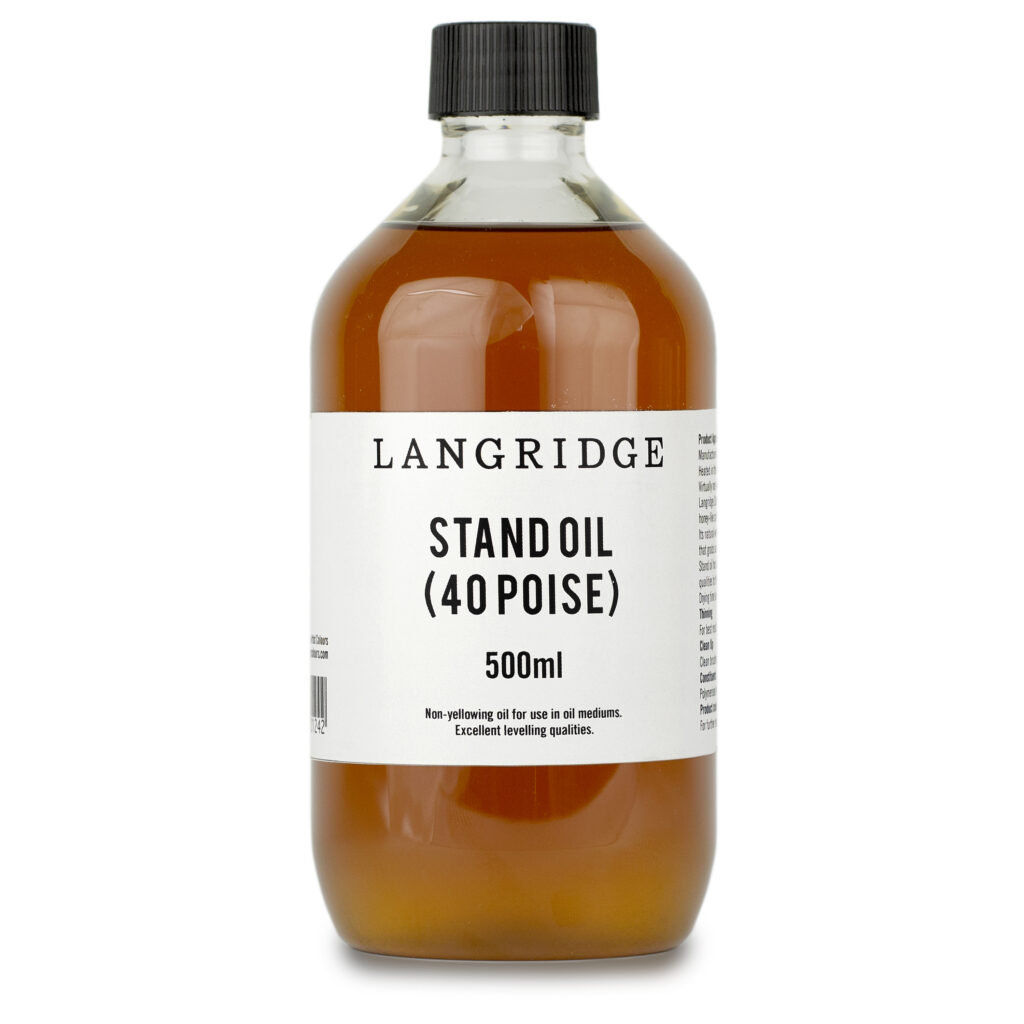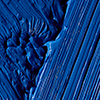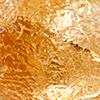Stand Oil
Non-yellowing oil for use in all oil mediums.
Thick and honey-like oil, gives enamel-like qualities to paint.
Should be diluted with solvent. Dries to a tough flexible film.
Stand oil is manufactured by heating, in the absence of oxygen, linseed oil to approximately 570° F.
The linseed oil polymerizes, that is, molecules of linseed link up to create long chains to create Stand Oil.
Constituents
Polymerised refined linseed oil (40 Poise)
Product code:
003

Stand Oil Product Information
Product Application
Langridge Stand Oil is diluted with Distilled Gum Turpentine or another appropriate artists’ solvent to produce oil mediums.
A unique quality of Stand Oil compared to all other natural artists drying oils is it is virtually non-yellowing. The process of polymerisation, however, makes Stand Oil thick and honey-like which cannot be used without the addition of artists’ solvent.
It is not suitable for milling oil colours due to its viscosity and the pH.
Stand Oil has a pH of approximately 6.5. Oil colours are best milled in drying oils with a higher acid level, such as Linseed Oil.
After 20-30 minutes of applying stand oil based mediums the surface will set-up to a tack that grabs any succeeding brush strokes. The wet, but tacky, paint surface can be readily painted into. This allows for a wet-in-wet technique with very controlled manipulation of paint including soft blending.
Stand Oil has pronounced leveling qualities. If a medium made with over 50% Stand Oil is added to oil colours the resulting paint film will exhibit an enamel finish with little or no physically raised brushmarks.
Because Stand Oil cannot be used without dilution, the proportion of oil to solvent determines whether it is a ‘fat’ or ‘lean’ medium. As a general rule it is considered a slow drying ‘fat’ oil and care should be used when using as an ‘underpainting medium’.
Mediums made with Stand Oil as their primary oil dry to a tough flexible film with a gloss finish.
Altering the drying rate of existing paints and mediums
General guide to manufacture of oil painting mediums
Underpainting medium: 1 part Stand Oil to 4 parts Distilled Gum Turpentine.
Lean painting medium: 1 part Stand Oil to 2 parts Distilled Gum Turpentine.
Fat painting medium: 1 part Stand Oil to 1 part Distilled Gum Turpentine.
Because Stand Oil is a slow drying oil Cobalt Driers may be added to accelerate the drying rate.
For the prevention of sinking-in of paint
If a support for painting (e.g. canvas) is poorly primed, oil colours will ‘sink-in’ to the surface and exhibit a dull and lifeless colour reflection. The oil from the paint is absorbed into the support, leaving the pigment underbound and the surface liable to crack or dust/flake off. In this case ‘oiling-out’ can rectify the paint film.
To even out the final reflective quality of the painting
Due to differences in the gloss or matteness of individual paints a finished picture generally has a range of reflective finishes within it. If these are very pronounced, a picture varnish cannot even these differences out.
Take 1 part Stand Oil and mix with 3 parts Artists White Spirit and apply as a very thin layer with a varnish brush. Leave for 4 days till fully touch dry.
This process is not providing a removable artists’ varnish, so the application of Retouch Varnish is still recommended. After 3-6 months a final picture varnish of the desired matte or gloss quality can be applied.
Thinning
For best results thin with Distilled Gum Turpentine. However, Langridge Low Toxic Solvent Solvent or Solvent 75 may be substituted. Due to the lower solvency action of the latter solvents, an increase in ratio compared to turpentine may be required. Over-thinning with solvents can lead to the partial destruction of the paint film. Langridge recommends a dilution rate of no more than 30%.
Appearance
Langridge Stand Oil is a honey-thick, pale yellow colour liquid with characteristic linseed odour.
The colour of the oil will not effect the oil colours with which it is mixed.
Clean Up
Clean brushes with any artists’ solvent (eg Gum Turpentine, Low Toxic Solvent, etc.).
For further washing apply a small quantity of Marseille or other pure olive oil soap and massage the bristles of the brush to release any remaining colour. Wash thoroughly in warm water. Leave to fully dry before using for oil colours.
Drying Times
7-14 days to touch dry.
Full film drying 3-6 months
Safety Data Sheet
Based on available information, this material is not classified as hazardous according to criteria of Safe Work Australia.




